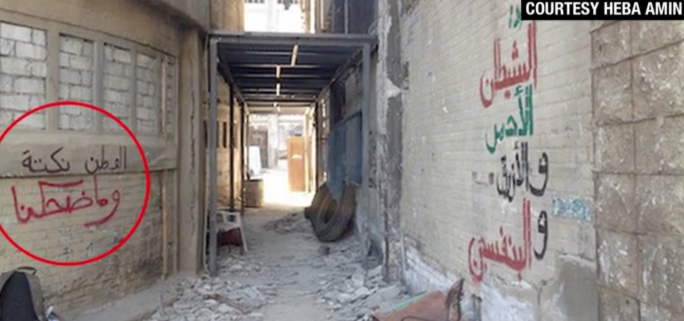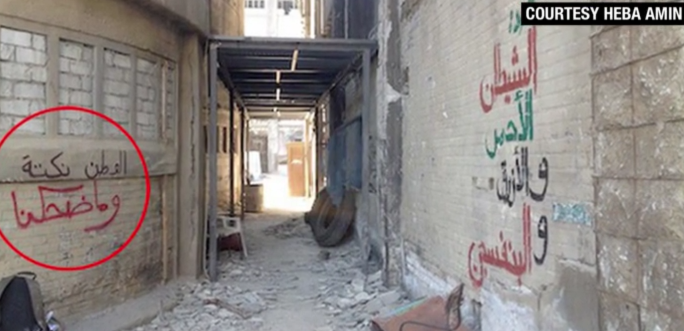Homeland criticism hidden in plain sight
By Carissa D. Lamkahouan
TMO Contributing Writer
A bit of trickery has been revealed on the set of “Homeland,” a popular Emmy Award-winning American television drama. Recently, three artists hired to work on a recent episode let the world in on their dirty little secret. As requested, they’d populated the show’s set with Arabic-language graffiti, but instead of writing innocuous slogans as directed, they inserted their own messages lambasting the show and its perceived stereotypical and negative depiction of Islam, Muslims and the Middle East.
During an episode broadcast earlier this month, star Claire Danes walked through what was staged as a Syrian refugee camp in Lebanon. She passed by graffiti slogans such as “Homeland is racist,” and “Homeland is a joke and it didn’t make us laugh.”
The tricksters are Berlin graffiti artist Stone, Heba Amin and Caram Kapp, and they revealed themselves and their stunt on Amin’s website. Though their work’s impact has definitely been felt and largely appreciated throughout the Muslim community, some non-Muslims, even those who enjoy “Homeland,” said those affiliated with the program got what was coming to them.
Lola Simon of Texas said she’s watched “Homeland” on occasion and really enjoys it, calling it “intense.”
However, she didn’t have much sympathy for those involved with the show when she was told how they’d been duped.
“If they’re too stupid to not fact check what the Arabic says then too bad,” she said.
She added, however, she does consider the artists’ action wrong because they didn’t do the job they were hired for, but she can understand their motivation. A native of South Louisiana, an area known for its strong Cajun heritage and colorful characters, Simon recounted her own moments of disgust when seeing her homeland derided.
“It’s awful (how Louisiana people) are portrayed on TV,” Simon said. “We look like dumb, ignorant people who live in the swamps and who can’t form a sentence.”
Melanie Brydle of Arkansas called the artists “brave” and said they took a big risk to get their message out there.
“If someone (who understands Arabic writing) would have edited that part of the show they could have been called out on what they did,” she said. “But, in the end, I think it was a good way to make a stand because it proved the point that no one was doing their research on the show.”
Brydle said she understands “Homeland” is a work of fiction and doesn’t put much stock into how people in other parts of the world are shown in the entertainment industry, especially when the depiction is negative and hostile.
“When I’m watching TV or a movie I look at the people as having the same life and the same basic needs as me,” she said. “They’re going to work, paying their bills, just like I am.”
But she admits not all Americans view television programs with the same perspective. With that in mind, particularly in regards to Muslims who are often bashed in the media and who sometimes face hostile and even violent repercussions, she said members of the media should be more responsible and take greater pains to be thoughtful and accurate in their content.
“If what you’re putting out there is having a negative impact on anyone of any culture, race or religion then you should do some research on your subject and get it right,” Brydle said. “If your show is on TV for everyone to watch it should at least be accurate. What “Homeland” is doing is just adding to the already bad image that has already been created of the Middle East and Muslims.”
















2015
1,713 views
views
0
comments